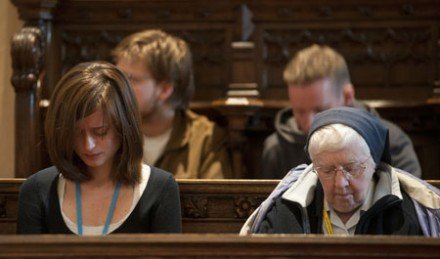Discernment groups are an excellent idea: they remind us lay people that we have a vocation too.
Discernment groups are an excellent idea:
they remind us lay people that we have a vocation too
Let’s hope they put an end to Shine Jesus Shine and X Factor-style retreats

Participants at an Invocation weekend at St Mary's College, Oscott
(Photo: Mazur/catholicchurch.org.uk)
I recently heard about a weekend retreat where young Catholics watched the Jack Nicholson film The Bucket List and were then encouraged to make a list of 10 things they wanted to do before they die. The life ambitions announced to each other included “a candlelit bath with my lover” and “visiting a fortune teller”.
Although I’ve tried to repress most of it, at 25 I still know all the actions to Shine Jesus Shine, and I still associate REM’s pop balladEverybody Hurts with night prayer at Lourdes during a pilgrimage in my teens. I sometimes grow nervous after Communion, in case a teenage girl will enthusiastically sign an entire hymn, despite the fact that no one in the congregation is deaf.
There is a propensity to regard the teachers and youth workers who champion such methods of prayer and catechesis as sinister but in my experience most were well meaning, however misguided.
But it is excellent news, in principle at least, that the National Office for Vocation is executing a three-year vocations framework to improve discernment for the young. However, its worth will depend on it contents and the approach of the individuals guiding vocations, who have a difficult task ahead of them.
For young people who are used to retreats of the aforementioned ilk, explaining to them that Newman’s prayer – that we all have “some definite service” – in fact does not mean “you’ve got the X Factor”, may seem a heartless or old-fashioned approach.
The irony is, however, that a serious approach to discernment provides profound recognition of each individual’s worth and dignity. I think Catholics often feel that unless they are called to the priesthood, describing medicine or teaching or motherhood as their “vocation” betrays delusions of grandeur. As well as forming new priests and nuns, this initiative will also help to remind lay men and women that each one of them has a specific calling.
I was once told by a woman that I did not understand “women who had a vocation”, and that’s why I was so heartless as not to support the ordination of women priestesses.
However, if the concept of vocation is widened and celebrated perhaps we can even convince hostile secularists that all men and women have a vocation in the eyes of the Church and secular obsession with priestly vocations alone is, dare I say it, narrow-minded.
- Vocations are calls to embark on exodus to Promised Land, pope says
- Spanish Olympic athlete to enter seminary after London games
- Call for Catholic schools to foster vocations
- “Open Your Hearts in Prayer” – Papal Nuncio Challenge to Young People at Invocation 2011
- ‘Today, young Christians face a new reality for which they are unprepared’


 Votes : 0
Votes : 0









